- Home
- Phyllis Ann Karr
Frostflower and Windbourne (Frostflower & Thorn) Page 12
Frostflower and Windbourne (Frostflower & Thorn) Read online
Page 12
There was only the one door into the garden at ground level, but a stairway with an intricately carved handrail led to an encircling balcony two floors above. She ascended the stairway, entered a passage on the upper floor, and soon located stairs that led down to a back doorway. Whether to keep prisoners in or thieves out, the heavy oak door was still on its hinges despite the season. Frostflower passed through and reached a back street.
Behind her was the comparatively undecorated back of the townmasters’ hall. To her right was a high wall with a few treetops showing above it—that would be the back of the garden around the first townmaster’s dwelling. To her left was a lower wall over the top of which, by walking as high as possible above the pavement, she could see a triangular exercise yard bounded on one side by the stark wall of the warriors’ barracks. Across the street was an even line of shop fronts, looking little different from any other respectable street of small shopkeepers, the windows closed and shuttered today.
Frostflower studied the back of the townmasters’ hall. From one of those windows Thorn and Windbourne must have made their jump into this street last winter when the snow lay thick and the shopwindows were closed with seasonal shutters to keep out cold as well as thieves. Here the way began to Crinkpetal’s house, where she had hoped to learn the present situation and be given a friendly refuge for her free-traveling. If ever she reached Crinkpetal or some other trustworthy friend, she must ask sure, simple directions to the townwall before she free-traveled to String-of-Beads.
She went into the front part of the warriors’ barracks. Behind the pillars that faced the open yard, she found a wide flagstone walk with a long, shallow rectangular pit in the middle, four steps leading down on all sides to its slightly uneven floor of brown tiles. On the other side of the pit, six small alcoves flanked a leather-curtained doorway. From behind the doorcurtain came the clash of blades—at least one pair of warriors, probably remaining to guard the barracks or awaiting a turn of duty. The alcoves were uncurtained and simply furnished, each with a table and two or three benches; she assumed they served as offices for the wallkeepers and waiting-rooms for complainants. The pit might be used for demonstration combats of some sort. She realized she had told Thorn more about the life of sorceri than Thorn had told her about that of warriors. But no doubt, thought the sorceress, I have shied away from such knowledge. Even now, hesitancy outweighed curiosity, and Frostflower did not go into the actual barracks.
Neither Inmara nor Elvannon and his family had forbidden her any priestly holy places except when they were in use for certain ceremonies. She explored the ancient holy hall at leisure. Once, all folk who lived outside farm walls had been expected to go to the nearest farm, or at least to a consecrated place in the open air, for the vital ceremonies of the priestly religion. As towns grew larger, they were allowed holy halls of their own, where neighboring farmers came to officiate, sometimes sending a younger member of the family while the ruling priest led the ceremonies in the farm, sometimes holding the town ceremonies a day or two later. The original theology had allowed only one holy hall to a town, for some of the ceremonies required the whole day. But when too many towns became too large for this system, the High Priestly Gathering had at last allowed each town as many holy halls as needed for its folk, and permitted priests to shorten or otherwise accommodate the ceremonies. The town’s original holy hall must be the site of any opening ritual, but such rites had in many places become brief private prayers for the priest or priests and a few others, like townmasters and lay acolytes, who would move about with them during the public ceremonials. Thus, an ancient holy hall like this one of Five Roads Crossing could be turned now into a sort of Truth Grove and Holy Glade for the priests alone, used as rarely as their town alcove-hall, and kept as reverently clean between whiles.
Frostflower had learned part of this from Elvannon and part from the books in Windslope Retreat, for sorceri had long preserved their own records of the history of the Tanglelands and the doings of its rulers. Some of it she might have guessed. The oak, beech, and elm trees planted closely around the outside of the holy hall suggested a grove and, though mature, seemed not to have been planned by the original builders, for many of the trunks obscured weathered images like half-statues carved into the stone walls. Inside, there was only one large chamber, rising to a high vaulted ceiling. A grove of artificial fruit trees filled most of the floor space, leaving a broad aisle around the edge between wall and grove. The trees were statues, carved chiefly from applewood; they were uncolored and stylized, but, as if to compensate for the artificiality, each tree reflected all the seasons, with leaves, buds, blossoms, full-grown fruit, and a few bare limbs. Carved birds poised ready to feed wooden worms to their gape-beaked chicks—a highly symbolic representation, since worms were held to be the semi-sacred pets of Aomu and Voma, and their consumption by birds was considered a natural sign of union between the deities of earth, weather, and harvest.
Within the imitation grove was a marble altar, white with a black top. Frostflower did not look long at this. Aside from the altar and the trees, the chamber was bare save for a number of stone chests that stood along the wall, looking much like small altars but with hinged lids. Being out of her body, the sorceress could not have lifted the lids had she wanted to. The building also had a cellar, entered by way of a small, inset alcove near the back. The spiraling passageway led to a small ablution chamber. A second archway showed that the tunnel led farther, but Frostflower decided she had explored enough deserted underground areas.
She had made great progress since last summer, in that she could keep the unpleasant memories under control and appreciate the beauty and artistry of the holy hall. Pray God these new priests did nothing to unbalance that tenuous appreciation!
Most of the afternoon she spent wandering in the holy hall’s garden, wishing that her entity could feel the breeze, even at the cost of also feeling the chill of the air or the heat of the sun. She often returned to the streets around the central building, but the shutters remained closed all day. After a long debate with herself, she tried entering a few of the houses, thinking she might hear conversation roused by the priest’s harangue; but no one was yet at home in the first house she entered, and in the second house, a man was using the close-room with the door open while he traded jocularities with a younger man. Her inadvertent intrusion on such easy immodesty kept the sorceress from repeating the experiment. Better to wait for conversations in public places.
At last, near sunset, she encountered Youngwise’s group on its way through the garden: a priest, three priestesses, the three townmasters, Eaglesight, and the two gatewarriors Frostflower had met that morning, Splathandle and Whistlepoint.
The priest and one priestess walked in front, the oldest townmaster between and slightly behind them. These three were conversing, not loudly, but freely. The other two priestesses, one tall and golden haired, the other not quite so tall and silvery blonde, followed, saying little, each of them escorted at a respectful half-pace behind by one of the younger townmasters. The three warriors brought up the rear, Eaglesight whistling very softly, the other two silent but not, it appeared, overly apprehensive. Frostflower moved alongside the front three to hear their talk.
“I was closer to him than you were, brother,” the lead priestess was saying.
“All the more reason, sister, they should come to me.”
“I hardly see that. Nor do I appreciate—”
“I simply meant to free you of the additional labor, Eleva.” The man seemed to have his annoyance under better control than the woman. Or was he baiting her on purpose? “Occupied as you are with your attempts to run Deveron’s Farm—”
“It is Eleva’s Farm now,” she replied, “and occupied as I am, I would still have time to deal with any who knew of the sorcerer’s escape!”
“Your Reverences,” said the old townmaster with a smile, “do not erode our h
umble town faith in our priests.”
“You mean that we should let our private squabbles fester inside our own farmwalls, Master Youngwise?” said the priestess Eleva. “Yes, I would be content to do that—all the more content if my good brother Rondasu stayed within his walls and left me alone in mine. But when he uses our common ceremony to hint to your townspeople that I am unjust and vindictive—”
“How could I consult with you ahead of time on my wording, sister,” said the priest Rondasu, “and still respect your wishes to be left alone?”
Master Youngwise smiled again and folded his hands together in his wide gray sleeves. “Shall you continue this quarrel, your Reverences, before Eaglesight’s prisoner?”
For a moment Frostflower felt guilty. This conversation was not meant for her hearing.
Rondasu said calmly, “A sorceress, caught listening to our ceremonies. We had best make an example of her.”
“Aye, an example of my vindictiveness!” said Eleva. “Give her purification over to me, Rondasu, and let me show the townsfolk the truth of what you told them.”
“The thing happened within our walls,” said Townmaster Youngwise. “Therefore, I must accept responsibility. Under your guidance, of course, Reverences.”
They had reached the edge of the paved road. “Your Reverences,” said one of the undermasters, “and Master Youngwise, if you have no further need of us…”
Youngwise waved his right hand. “Yes, yes, Smoothermore, Clearthinking, you may seek your suppers. This is a small enough affair that one of us should be able to bear the responsibility alone.”
Decreased by two, the group went on across the open yard. “It may have happened within the town walls,” said Rondasu, “but it was obviously an offense against us and our ceremonies.”
“As also against the folk of Five Roads Crossing,” replied the townmaster, “in that your ceremonies today were extraordinary and directed at us. Moreover, she was not actually found inside the holy hall, but on the street outside.”
“Wallkeeper!” said the priest, turning to look back at Eaglesight.
“Reverence?”
“The sorceress was leaning with her back against the holy hall?”
The aging warrior glanced at the priest, the townmaster, and Eleva. “That I couldn’t say, your Reverences. She was sitting cross-legged and I approached her from the front.”
“You were derelict not to notice this crucial detail, Wallkeeper,” said Youngwise. “Well, we shall hope that the sorceress remembers it.” His voice was stern; but Eaglesight, who had stiffened while answering the priest, relaxed at the townmaster’s rebuke, almost shrugged as she touched fist to lips, and soon resumed her soft whistling.
The priest fingered his gold necklace. “Whatever the wretch says, she will clearly have been sitting with her back against the wall.”
“When one sits cross-legged, brother,” said Eleva, “one tends to lean forward, not backward. And these people have their own rules. For her to touch our holy hall may seem as distasteful to her as to us.”
“Distasteful?” Rondasu raised his brows. “A mild word for it, sister. And if she does indeed share this opinion, she could have had no other reason to sit so near, than to spy for her murdering fellow.”
Eleva stopped in the middle of the yard and turned to face her brother. Their kinship was obvious, both in their brown hair and eyes and in the determination of their wills; but their difference was equally obvious, her anger forthright and his half veiled. “So you intend to trap her whatever she says, Rondasu! As you trapped that sorcerer—guilty of my husband’s death because he was captured, and even more guilty because, chained down with no hope of mercy from us, he dared escape!”
“You forget yourself, sister,” said the tall golden-haired priestess, who must be Shara. “Our brother did not entrap the sorcerer. The townwarriors of Five Roads Crossing captured him, and he escaped again, with the connivance of that wretched swordswoman, before we had so much as been notified of his capture.”
Eleva glared at the last speaker, opened her mouth, then hesitated as if changing what she had been about to say. “Well, then, Rondasu, if their sorceress was touching the wall, she is mine. As the sorcerer will be mine should we recapture him, though he would be a full flask of stupidity if he were ever to come near Five Roads again.”
“I was the officiating priest, sister Eleva, you only my acolyte,” said Rondasu.
“Aye—on my sufferance, because the ceremonies were your idea. But I am still the one most closely concerned in my husband’s death, and by that right I claim the sorceress.”
“Someday, dear sister,” murmured Rondasu, “you may wish you had repeated less often that you are the person most concerned in Deveron’s death.”
“If I might venture to suggest to your Reverences,” said Youngwise, “that the sorceress can hardly be questioned while we stand here in the open yard?”
Eleva turned sharply and walked toward the townmasters’ hall, leaving the others to follow.
Rondasu soon matched her pace. “So, then, sister, you admit the sorceress must be involved in your husband’s death, that you claim her although I was officiating priest?”
“If my husband had not died, you could not have played with your pretty ceremony today. That is my claim to the sorceress.”
“Someday, Eleva,” said the priest, “you’ll weave your own bonds with that half-heretical tongue of yours.”
Frostflower doubted that any of the others except herself overheard this last exchange. The brother and sister had too far outstripped the rest. As for the sorceress, self-concern had finally outweighed distaste for intruding on privacy, and she felt no compunction about listening.
But how much good had it done her? Might Eleva have spoken as she did because she knew Windbourne had not killed her husband—and might she know that because she herself had poisoned him? Might Rondasu’s sternness rise from a sincere belief in the sorcerer’s guilt, and, if so, might it not be better to fall into Rondasu’s power with some hope of convincing him of the truth? How far would Youngwise and Eaglesight go to demonstrate their apparent neutrality? And how could Frostflower use to her advantage what she had learned, pledged as she was to speak truth or nothing, and more than ever confused where her advantage lay?
Reaching the townmasters’ hall, Rondasu strode up the steps without hesitation, pushed aside the brown linen doorcurtain, and only then paused to look back at the others. Eleva waited at the foot of the stairs until the rest of the party came up. The tall priestess, Rondasu’s other sister, climbed at once to his side, took the curtain from his hands, and held it back while he entered. The silvery-haired priestess, who must be Intassa, looked from Eleva to the pair at the door, blinked, pursed her lips, and quickly climbed the stairs. An expression of distaste seemed to cross Eaglesight’s face, one of open and unveiled disgust Eleva’s, and Youngwise, pausing beside her, muttered, “They’ll make the poor lady another like themselves yet.”
“Not like themselves.” Eleva touched his elbow. “They’ll destroy her before they can corrupt her completely.”
So Frostflower understood that some bond of confidence existed between Eleva and the old townmaster. But were they disgusted with her siblings’ malice or with some quality that other folk would not have called “corruption”?
On seeing the priests and townmaster enter, the warrior behind the judgment table rose and stood with left fist to lips until they reached her end of the hall. She was not the same one who had been there at midday.
“It’s near enough sunset, Keeper Clampen,” said Youngwise. “You may go. Knot the cords on your way out.”
The warrior nodded, staring for a moment but saying nothing as the party got lamps from a cupboard, lit them, and passed on into the back passage.
Youngwise had fall
en back with Eaglesight. The first wallkeeper shook her head. “And you call Clampen a third wallkeeper?” she muttered. “Thorn wouldn’t have let us all get by without a question or two. That bloody cow Strongneck wouldn’t have either, whether she could do anything with the answers or not.”
“Aye, and see where Thorn’s shrewdness brought her,” the townmaster muttered in reply. “And Strongneck, too, one might add, may her new employer have better satisfaction of her than we had.”
“Strongneck will do for his purposes well enough—born to be a blasted farmwarrior, that one. But she was better than Snagcut, and as for this clodwit Clampen…”
“Aye, aye, you’ll have more choice in your next underkeepers, Eagle, but we had to give my undermasters some sop. Must I remind you of the grumbling because Thorn had been your choice?”
“So now Thorn was my choice alone, was she?” murmured the wallkeeper.
When they reached the underground area, the group walked in silence. Was it part of their plan to take their captive unaware? She would have hurried on ahead, but she could not remember the way.
At last they reached her cell. Dowl trotted forward the length of his chain and stood wagging his tail to greet them. The motionlessness of Frostflower’s body was not at first apparent in the failing light, and the priest muttered, “Doesn’t so much as raise her head to look at us, the demons’-bait.”
The townmaster began in a louder tone, “So, sorceress…”
Frostflower heard no more for a few moments. Of necessity, there was a short interval when she lost all sensual contact with the outside world while reentering her flesh, the sight and hearing of the free entity cut off, the senses of the body not yet touching consciousness. When she opened her eyes, the priestess Eleva was bending over her, holding a lamp near her face and stroking Dowl with her other hand.

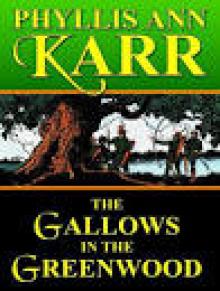 The Gallows in the Greenwood
The Gallows in the Greenwood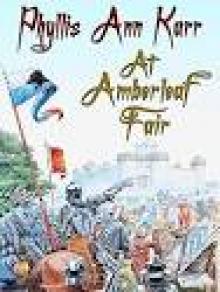 At Amberleaf Fair
At Amberleaf Fair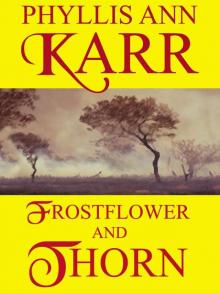 Frostflower and Thorn
Frostflower and Thorn The Fanciers & Realizers MEGAPACK
The Fanciers & Realizers MEGAPACK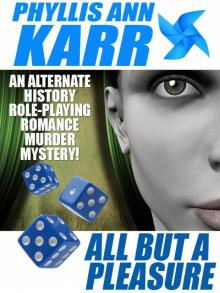 All But a Pleasure
All But a Pleasure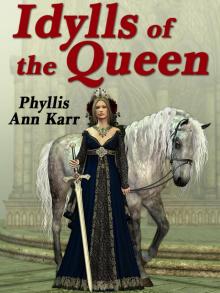 The Idylls of the Queen
The Idylls of the Queen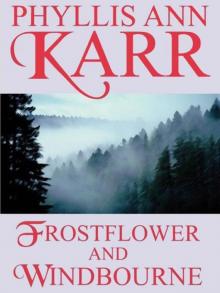 Frostflower and Windbourne (Frostflower & Thorn)
Frostflower and Windbourne (Frostflower & Thorn)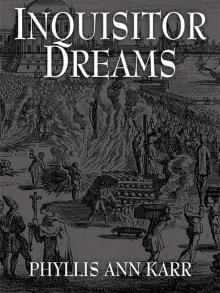 Inquisitor Dreams
Inquisitor Dreams